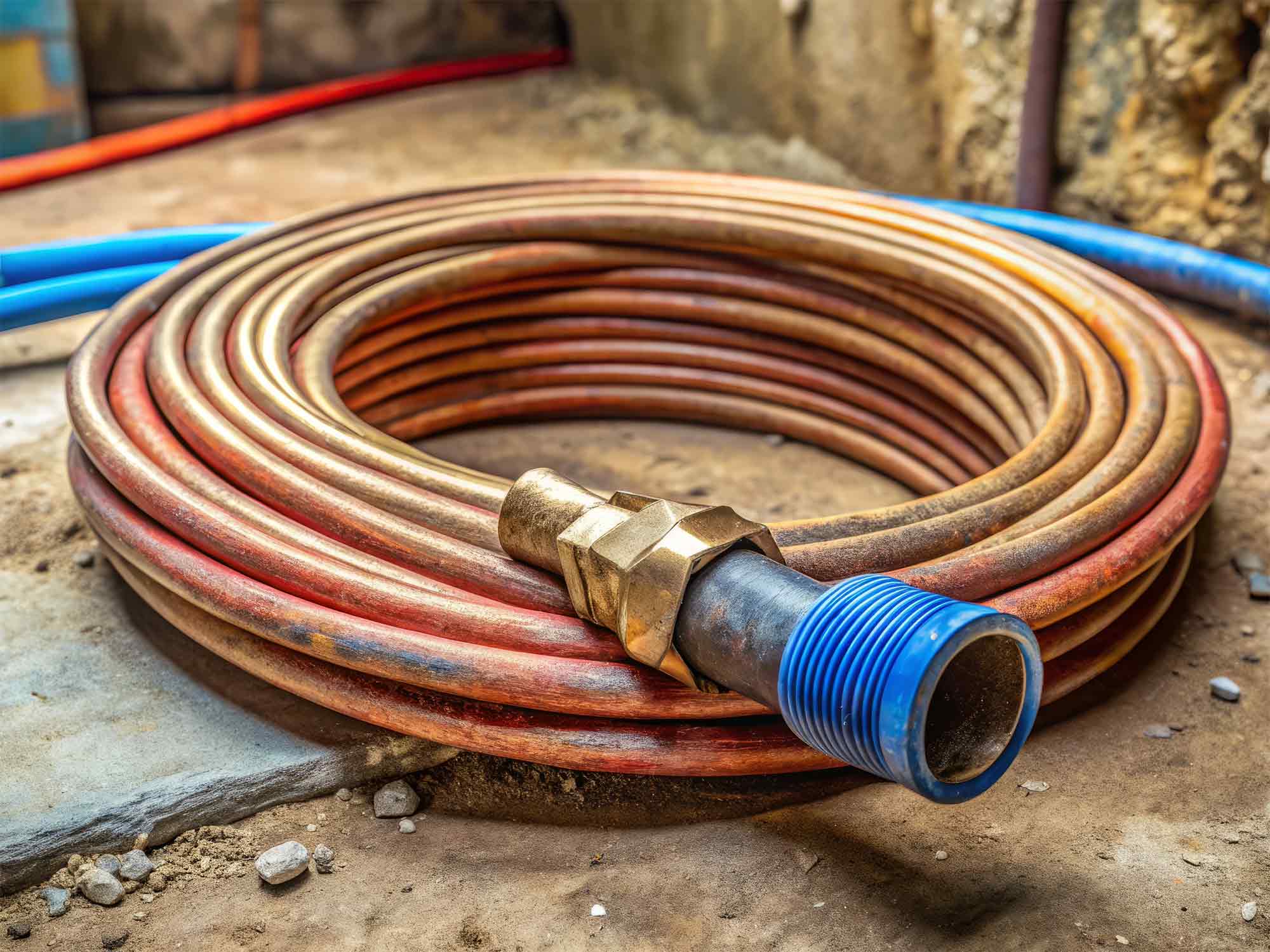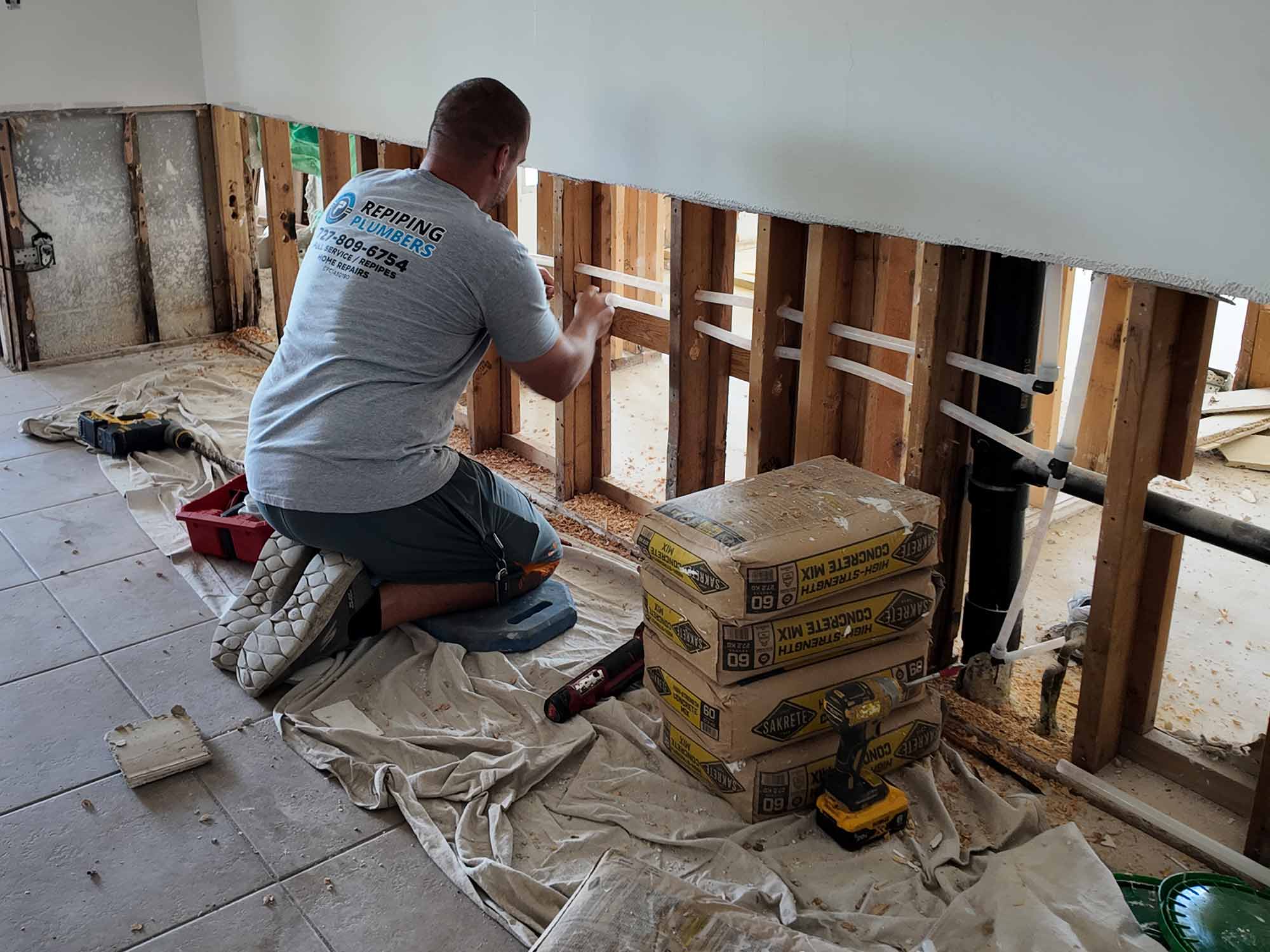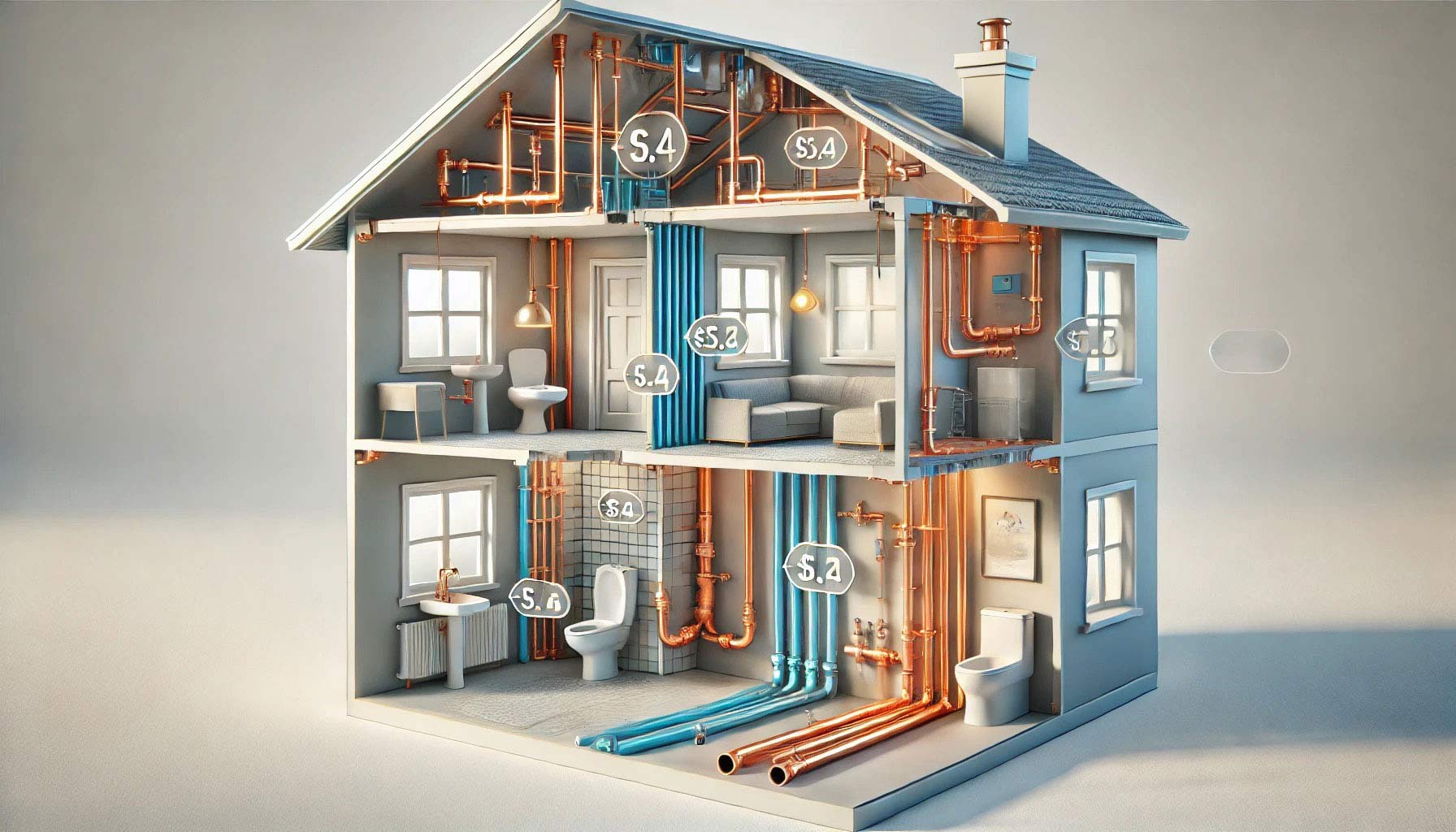When it comes to repiping your home, choosing the right material for your plumbing system is crucial. Whether you’re considering a whole house repipe or just upgrading specific sections of your home, understanding the differences between PEX repiping and copper repiping can help you make the best decision for your needs. Let’s explore the key distinctions between these two popular options and understand the cost to repipe a house, how long it will take, and how to find the best professionals for the job.
1. Material Composition
- PEX: PEX (cross-linked polyethylene) is a flexible plastic material often used in plumbing repipe projects. It’s created by cross-linking polyethylene, making it durable and ideal for both small home repipe projects and full scale whole home repipe upgrades. It’s lightweight and flexible, making it an easier installation compared to copper.
- Copper: Copper repiping has been the traditional method for years, offering a durable, long-lasting solution. Copper pipes are known for their corrosion resistance and longevity, often lasting over 70 years. Copper repipe specialists like the Repiping Plumbers are skilled in this process and use soldering to connect the pipes. While more expensive than PEX, copper offers the durability many homeowners prefer for their plumbing repipe needs.
2. Installation Process
- PEX: One of the main benefits of PEX repipe is its relatively easy installation. PEX doesn’t require soldering, which can reduce the overall repipe house cost. The flexibility of PEX allows it to snake through walls and floors with fewer joints, cutting down on installation time. Our Repiping Plumbers can install PEX faster, which might result in a lower average cost to repipe a house (guaranteed!)
- Copper: Installing copper repiping is more labor-intensive, requiring many copper repipe specialists to handle soldering and brazing. The repipe house cost for copper can be higher due to the time-consuming installation process and the need for more specialized skills. However, if you’re looking for a plumbing repipe company that specializes in copper, it’s always best to consult plumbing repipe specialists for a precise estimate on the cost to repipe a house with copper materials.
3. Durability and Longevity
- PEX: While PEX can last up to 50 years or more, it’s important to be mindful of certain factors, like UV exposure or rodents chewing on the pipes. If you’re opting for a PEX repipe, make sure to consider where the pipes will be located. PEX is best suited for indoor use unless it’s properly covered for UV protection.
- Copper: Copper repiping is a time-tested solution. Copper pipes last longer—up to 70 years—and are resistant to most corrosion types. However, they are more susceptible to freezing, which could increase the cost to repipe house with copper in colder climates.
4. Cost
- PEX: The average cost to repipe a house with PEX is often lower than copper due to the material cost and easier installation process. PEX repipes also require less labor and fewer tools, which can significantly lower the cost to repipe a house. If you’re looking for a more budget-friendly option for your plumbing repipe, PEX is often the preferred choice.
- Copper: The repipe cost for copper repiping tends to be higher. In addition to the material costs, the complexity of the installation process adds to the repipe house cost. If you’re interested in copper repipe specialists, it’s important to get multiple quotes to find the best repipe company that fits your budget.
5. Water Quality
- PEX: PEX is non-toxic and doesn’t leach chemicals into the water supply. However, some people notice a slight plastic taste or smell, especially if the water sits for an extended period. It’s also less prone to leaching copper, which can be a concern for some homeowners with copper repiping systems.
- Copper: Copper repiping has minimal impact on water taste or quality but can introduce trace amounts of copper into the water over time. This isn’t usually a significant issue unless you have acidic water. In areas with hard water, copper repipe specialists may recommend installing a water softener to prolong the life of the pipes and reduce potential damage.
6. Resistance to Freezing
- PEX: PEX pipes are more resistant to freezing because of their flexibility. If the water in PEX repiping freezes, the pipe will expand rather than crack. This makes PEX a good choice for homeowners in colder climates, reducing the risk of plumbing emergencies during the winter months.
- Copper: Copper pipes are prone to freezing, which could lead to burst pipes and costly repairs. If you live in an area with harsh winters, it’s essential to insulate copper repiping to prevent freezing. This could add to the cost to repipe house with copper in colder climates.
7. Environmental Impact
- PEX: While PEX is durable and long-lasting, it’s made from petroleum-based plastic, which has an environmental impact. However, PEX is lightweight, reducing transportation energy, and it’s durable, which means fewer replacements are needed over time.
- Copper: Copper repiping is a more environmentally friendly option overall, as copper is a recyclable metal. The mining process for copper can be resource-intensive, but once the copper is installed, it can last for decades, making it a more sustainable choice in the long run.
8. Maintenance and Repairs
- PEX: If you opt for a PEX repipe, maintenance and repairs are generally simpler than with copper. PEX is resistant to corrosion, and it’s easier to replace or add to sections of piping. However, PEX is vulnerable to damage from UV rays and rodents, so it’s important to keep your system protected.
- Copper: Copper pipes are known for their durability, but they can develop issues like pinhole leaks or corrosion over time. Repairing copper repiping can be more complex, and it’s advisable to hire repipe specialists for any necessary repairs.
9. How Much Does It Cost to Repipe a House?
Understanding accuratge repipe house costs is essential when planning a repiping project. The cost to repipe a house, in Florida especially, will vary depending on factors like material choice, the size of your home, and local labor rates.
On average, the cost to repipe house with PEX is typically lower than copper, and the whole house repipe cost can range from $5,000 to north of $9,000 for PEX. On the other hand, the repipe cost for copper might range from $6,000 to $15,000 or more, depending on your home’s size and complexity.
Repipe Plumbing Solutions Conclusion
When choosing between PEX and copper for your home repipe, the decision comes down to your budget, home location, and preferences for durability and ease of installation. If you’re looking for a cost-effective and flexible option, PEX may be the best choice, while copper repiping offers long-lasting durability and a more traditional feel. Make sure to consult with repipe specialists to understand the repipe plumbing solutions that best meet your needs and budget.
Looking for repipe plumbers near you? You’re in luck! The Repiping Plumbers operate up and down the Gulf Coast of Florida exclusively in Pinellas, Hillsborough, Pasco, Hernando, and Citrus counties.
Don’t hesitate to contact our plumbing repipe specialists to get an accurate quote. Through our consultation, we will cover all repipe plumbing options available for your home including available financing.




